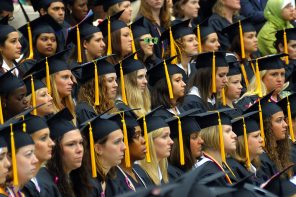We act in accordance with our self-image. This self-image—which, in turn, governs our every act—is conditioned in varying degree by three factors: heritage, education, and self-education.
The part that is inherited is the most immutable. The biological endowment of the individual—the form and capacity of his nervous system, his bone structure, muscles, tissue, glands, skin, senses—are all determined by his physical heritage long before he has any established identity. His self-image develops from his actions and reactions in the normal course of experience.
Education determines one’s language and establishes a pattern of concepts and reactions common to a specific society. These concepts and reactions will vary according to the environment into which a person is born; they are not characteristic of mankind as a species, but only of certain groups or individuals.
Education largely determines the direction of our self-education, which is the most active element in our development and in more frequent use socially than elements of biological origin. Our self education influences the manner in which external education is acquired, as well as the selection of the material to be learned and the rejection of that which we cannot assimilate. Education and self-education occur intermittently. In the first weeks of an infant’s life, education is chiefly a matter of absorbing the environment, and self-education is almost nonexistent; it consists only of refusal of, or resistance to, anything that is organically alien and unacceptable to the infant’s inherited characteristics.
Self-education progresses as the infant organism grows and becomes more stable. The child gradually develops individual characteristics; he begins to choose among objects and actions in accordance with his own nature. He no longer accepts everything that training tries to impose on him. Imposed education and individual propensities together set the trend for all our habitual behavior and actions.
Of the three active factors in the establishment of our self-image, self-education alone is to some extent in our own hands. Our physical inheritance comes to us unsolicited, education is forced upon us, and even self-education is not entirely volitional in the early years; it is decided by the relative strength of inherited personality, individual characteristics, the effective working of the nervous system, and by the severity and persistence of educational influences. Heritage makes each one of us a unique individual in physical structure, appearance, and actions. Education makes each of us a member of some definite human society and seeks to make us as like every other member of that society as possible. Society dictates our mode of dress, and thereby makes our appearance similar to that of others. By giving us a language, it makes us express ourselves in the same way as others. It instills a pattern of behavior and values in us and sees to it that our self-education shall also operate so as to make us wish to become like everyone else.
As a result, even self-education, which is the active force that makes for individuality and extends inherited difference into the realm of action, tends to a large extent to bring our behavior into line with that of others. The essential flaw in education as we know it today is that it is based on ancient and often primitive practices whose equalizing purpose was neither conscious nor clear. This flaw has its advantage since, having no defined purpose other than to mold individuals who will not be social misfits, education does not always succeed entirely in suppressing self-education. Nonetheless, even in the advanced countries, in which educational methods are constantly improving, there is increasing similarity of opinions, appearance, and ambitions. The development of mass communication and political aspirations to equality also contribute significantly to the present heightened blurring of identities.
Modern knowledge and techniques in the fields of education and psychology have already enabled Professor B. F. Skinner, the Harvard psychologist, to demonstrate methods for the production of individuals who are “satisfied, capable, educated, happy, and creative.” This is also, in effect, the aim of education, even though it is not expressly so stated. Skinner is certainly right about the effectiveness of these methods, and there is little doubt that in time we shall be able to develop units in the form of man that are educated, organized, satisfied, and happy; if we use all our knowledge in the field of biological inheritance, we may even succeed in producing several different types of such units to satisfy all the needs of society.
This utopia, which has a feasible chance of happening in our lifetime, is the logical outcome of the present situation. In order to bring it about we need only produce biological uniformity and employ suitable educational measures to prevent self-education.
Many people feel that the community is more important than the individuals of which it is composed. A trend toward the improvement of the community is found in almost all advanced countries, the difference being only in the methods chosen to realize this goal. There seems to be general agreement that the most important thing is to improve the social processes of employment, production, and provision of equal opportunities for all. In every society care is taken that the education of the younger generation should result in qualities making for as uniform a community as possible that will then function without any great disturbance.
It may be that these tendencies of society agree with the evolutionary trend of the human species; if so, everyone should certainly direct his efforts toward the achievement of this aim.
If, however, we for a moment disregard the concept of society and turn to man himself, we see that society is not merely the sum total of the people who constitute it; from the individual’s point of view it has a different meaning. It has import for him, first of all, as the field in which he must advance in order to be accepted as a valuable member, his value in his own eyes being influenced by his position in society. It is also important to him as a field in which he may exercise his individual qualities, develop and give expression to particular personal inclinations that are organic to his personality. Organic traits derive from his biological inheritance, and their expression is essential for the maximal functioning of the organism. As the trend to uniformity within our society creates innumerable conflicts with individual traits, adjustments to society can be solved either by the suppression of the individual’s organic needs, or by the individual’s identification with the society’s needs (in a manner that does not appear to him to be imposed), which may go so far as to make the individual feel that he is debased whenever he fails to behave in accordance with society’s values.
The education provided by society operates in two directions at once. It suppresses every nonconformist tendency through penalties of withdrawal of support and simultaneously imbues the individual with values that force him to overcome and discard spontaneous desires. These conditions cause the majority of adults today to live behind a mask, a mask of personality that the individual tries to present to others and to himself. Every aspiration and spontaneous desire is subjected to stringent internal criticism lest they reveal the individual’s organic nature. Such aspirations and desires arouse anxiety and remorse and the individual seeks to suppress the urge to realize them. The only compensation that makes life durable despite these sacrifices is the satisfaction derived from society’s recognition of the individual who achieves its definition of success. The need for constant support by one’s fellows is so great that most people spend the larger part of their lives fortifying their masks. Repeated success is essential to encourage the individual to persist in this masquerade.
This success must be visible, involving a constant climb up the socioeconomic ladder. If he fails in the climb, not only will his living conditions become more difficult, but his value will diminish in his own eyes to the point of endangering his mental and physical health. He can scarcely allow himself time for a vacation, even if he has the material means. The actions and the drive that produces them—necessary in order to maintain a mask free of flaws and cracks lest he be revealed behind it—do not derive from any basic organic needs. As a result, the satisfaction derived from these actions even when they are successful is not a revitalizing organic satisfaction, but merely a superficial, external one.
Very slowly, over the years, a man comes to convince himself that society’s recognition of his success should and does give him organic contentment. Often enough the individual becomes so adjusted to his mask, his identification with it so complete, that he no longer senses any organic drive or satisfactions. This can result in the revelation of flaws and disturbances in family and sex relations that may always have been present but that have been glossed over by the individual’s success in society. And, indeed, the private organic life and the gratification of needs deriving from strong organic drives are almost unimportant to the successful existence of the mask and to its social value. The great majority of people live active and satisfactory enough lives behind their masks to enable them to stifle more or less painlessly any emptiness they may feel whenever they stop and listen to their heart.
Not everyone succeeds in occupations that society considers important to the degree that enables them to live a satisfactory mask-life. Many of those who fail in their youth to acquire a profession or trade that would offer them sufficient prestige to maintain their mask-lives claim that they are lazy and have neither the character nor the persistence to learn anything. They try their hand at one thing after another, switch from job to job, invariably considering themselves nonetheless fit for whatever may turn up next. This confidence in their own abilities gives them sufficient organic satisfaction to make each stab at something new worth the effort. These people may be no less gifted than others, maybe even more so, but they have acquired the habit of disregarding their organic needs until they can no longer find genuine interest in any activity. They may happen to stumble upon something at which they may last longer than usual and even attain a certain proficiency. But it will still be chance that has given them an occupation and thereby a foothold in society that will justify their own assessment of their worth. At the same time their precarious self-regard will drive them to seek success in other spheres, as likely as not in promiscuous sex. This promiscuity, which parallels their constant changing of jobs, is activated by the same mechanism of belief in some special gift of their own. It raises their value in their own eyes and, again, gives them at least partial organic satisfaction; enough, in any event, to make it worth their while to try again.
Self-education—which, as we have seen, is not altogether independent—also causes other structural and functional conflicts. Thus, many people suffer some form of disturbance in digestion, elimination, breathing, or bone structure. Periodic improvements in one of these malfunctions will bring about improvement in the others, and increase general vitality for a time, followed in almost every instance by a period of lowered health and spirits.
It is obvious that of the three factors determining a man’s general behavior, self-education alone is appreciably subject to will. The question is really to what extent and, most particularly, in what way one can help oneself. Most people will choose to consult an expert—the best answer in serious cases. However, most people do not recognize the need, nor have they any wish to do so; in any case, it is doubtful whether the expert will be of much use. Self-help is, in the final instance, the only way open to everyone.
This way is hard and complicated, but for every person who feels the need for change and improvement it is within the limits of practical possibility, bearing in mind that several things must be clearly understood to make the process, the acquisition of a new set of responses, not too difficult.
It must be fully realized from the start that the learning process is irregular and consists of steps, and that there will be downs as well as ups. This applies even to a matter as simple as learning a poem by heart A man may learn a poem one day, and remember almost nothing of it the next. A few days later, and without any further study, he may suddenly know it perfectly. Even if he puts the poem entirely out of his mind for several months, he will find that a brief rehearsal will bring it back completely. We must not become discouraged, therefore, if we find we have slipped back to the original condition at any time; these regressions will become rarer and return to the improved condition easier as the learning process continues.
It should further be realized that as changes take place in the self, new and hitherto unrecognized difficulties will be discovered. The consciousness previously rejected them either from fear or because of pain, and it is only as self-confidence increases that it becomes possible to identify them.
Most people make sporadic attempts to improve and correct themselves even though they are often done without any clear awareness of it. The average person is satisfied with his achievements and thinks he needs nothing except some gymnastics to correct a few acknowledged faults. Everything that has been said in this introduction is in fact addressed to this average man; that is, to the man who thinks none of it concerns him.
As people try to better themselves, different stages of development can be found in each of them. And as each one progresses, the means for further correction will have to become increasingly finespun. I have outlined in this book the first steps on this road in considerable detail to enable readers to go even further under their own power.
Preface to AWARENESS THROUGH MOVEMENT




